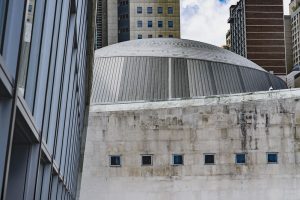Yesterday, the Associated Press reported that Myanmar’s military junta has attempted – unsuccessfully – to replace the country’s ambassador to the United Nations, foreshadowing a looming battle over diplomatic recognition at the world body.
In a letter to U.N. Secretary-General Antonio Guterres dated May 12, a copy of which was obtained by the news agency, the junta’s Foreign Minister Wunna Maung Lwin said he had appointed the former military commander Aung Thurein as Myanmar’s U.N. ambassador.
Wunna Maung Lwin said in an accompanying letter that Kyaw Moe Tun, Myanmar’s currently recognized U.N. ambassador, “has been terminated on Feb. 27, 2021, due to abuses of his assigned duty and mandate.”
Shortly after the February 1 coup that brought the military back to direct rule, Kyaw Moe Tun gave an emotional address to the U.N. General Assembly, in which he publicly broke with the junta and appealed for “the strongest possible action from the international community” to restore democracy to the country.
He also urged all countries to refuse to recognize the military regime, a call that has also been echoed by human rights groups and senior U.N. officials including Christine Schraner Burgener, the secretary-general’s special envoy for Myanmar.
The day after Kyaw Moe Tun speech, later described by diplomats as “brave” and “courageous,” Sen. Gen. Min Aung Hlaing’s military administration fired the ambassador from his post, appointing his deputy in his place. But Kyaw Moe Tun refused to leave, and the AP reports that there has been no reported action on the foreign minister’s letter from May. Under the U.N.’s rules, delegations whose credentials have been challenged “retain all their rights until, and unless, they are revoked by a [General Assembly] decision.”
While the U.N.’s rules have allowed Kyaw Moe Tun to remain in his post, a contrasting situation has played out in London, where Myanmar’s Ambassador to the United Kingdom Kyaw Zwar Minn, who also pledged loyalty to the ousted government, was hurled into limbo after being locked out of the London embassy building by his deputy and the country’s military attache in April.
While the British Foreign Secretary Dominic Raab condemned the “bullying actions of the Myanmar military regime,” the U.K. government has since accepted the change. It has done so because of established diplomatic norms: according to the Vienna Convention on diplomatic relations, an ambassador’s job officially ends once the host country has been informed. The U.K. Foreign Office confirmed it had received such a notification, and said that it “must accept the decision taken by the Myanmar regime.”
However, Prime Minister Boris Johnson’s Conservative government, which has been forthright in its condemnation of the coup and has imposed a raft of sanctions on senior members of the regime, remains mum on whether it has accredited the junta’s chosen replacement as ambassador, the former fighter pilot Htun Aung Kyaw.
The issue was raised in Parliament on July 19, in a written question from Stephen Kinnock, shadow minister for foreign and commonwealth affairs, who asked whether the government has accredited Htun Aung Kyaw. Nigel Adams, the minister of state for the Foreign, Commonwealth and Development Office, refused to provide any details, saying “we do not discuss the details of accreditation requests in specific cases.”
As James Landale, the BBC’s diplomatic correspondent, noted in April, the situation presents a dilemma for the British government. By accepting that Kyaw Zwar Minn has been sacked as ambassador, as it is bound to do under the Vienna Convention, “it will face accusations that it is tacitly accepting the authority of the regime in Myanmar. And this is something it does not want to do.” A similar charge would follow its acceptance of his replacement.
In addition to the conflict between established diplomatic norms and the morality of recognizing the current government, the situation also points to a deeper dilemma, which is that Western governments that oppose the coup are also unwilling to take the plunge and formally recognize the opposition National Unity Government (NUG) as Myanmar’s legitimate government.
This likely reflects the fact that the military junta, however contested by the population, is in control of the central state apparatus, while there are clear doubts as to the NUG’s ability to gain power in anything short of a grinding, years-long nationwide civil war or an outside military intervention.
In this context, there is no good practical argument (though there is certainly a moral one) for forfeiting diplomatic representation inside Myanmar, since the junta would almost certainly eject from the country any mission that recognized the NUG. This is especially the case given the humanitarian emergency that is currently unfolding due to the explosion of COVID-19, and the perhaps unavoidable need to engage, even at arm’s length, in order to provide vital aid. The best remaining option is a form of engagement with the NUG and opposition forces that sends a powerful signal, but stops short of formal recognition.
As I noted in an article in the June issue of The Diplomat magazine, these disagreements could soon be resolved – at least theoretically – at the U.N. General Assembly’s Credentials Committee, a nine-member body that is in charge of accrediting diplomats.
The Committee is scheduled to convene for its annual meeting next month, and if Myanmar comes up (as is likely), the proceedings could be contentious: among its current members are the United States, which has voiced its strong opposition to the coup, and China and Russia, both of which have decided to recognize and work with the new military government. Whichever way the U.N. committee ends up ruling – if it ends up making a definitive ruling – it could play an important role in deciding how foreign governments choose to engage with the two warring factions in Myanmar’s seemingly intractable crisis.
































